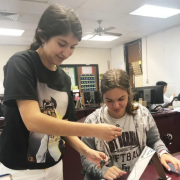Why “I’m Applying to College” Should Not Be the Motivation for Helping People
Why do high school students take the time to volunteer and help people?
Many of them, if not most, have a sincere desire to do good in the world. However, as most teachers, parents and counselor know, many are also motivated by the need to do things that make them look good to the colleges where they are applying.
That could explain why high school students have engaged in projects like these . . .
- A high school sophomore who was taking karate classes decided she would teach self-defense skills to older people who were living in assisted living facilities. Good idea. But two years later when she left for college, her program ended because she was unable to interest younger students in becoming involved.
- A group of high school students in the suburbs joined a program that drove into a nearby city on weekends, where they distributed food to homeless people. One of the students felt that the program didn’t present a strong enough credential to list in his college applications. “I didn’t start the charity, I just got into some parent’s SUV and drove around looking for homeless people” he said. So he went looking for a different cause to support – hopefully one where he could take a leadership role and look better to colleges.
Motivating Young People to Do Good
If you are an educator, perhaps you don’t want to become involved in this issue at all. But if you want to help students become engaged in projects that will teach them the real value of doing good in the world, perhaps it is something you should think about.
And if you would like to move forward, it will be helpful to know about some findings from the Career Pathways and 21st Century Skills study that was administered nationwide by the Student Research Foundation in Fall 2018. A total of 35,410 high school students took part.
When asked “In middle school or high school, have you taken action to help people?” . . .
- 80% of respondents said they had taken action in their local communities
- 25% said they had taken action in other parts of the country
- 16% said they had taken action in other countries
How many students are already helping others in their local communities? . . .
- White students are the most likely to have taken action locally, while Hispanics are the least
- Students who are aspiring to attend private colleges are most likely to have helped locally
- “A” students helped most often and “C” students the least
- Female students are more likely than males to engage locally
- Midwestern students are the most likely to have helped, and Western students the least
- High school seniors are the most likely to have helped, and freshmen the least
Some Suggestions for Motivating Students to Get Involved in Ways that Really Help
- Talk sustainability. If a student wants to create a new program and make a big splash, what are the odds that the program will continue after he or she heads off to college?
- Discusses resources. If a student starts a new program how will it be financed? Discussing this question with students offers an opportunity to learn about the fact that charities don’t just happen because people have an idea. They need to be supported through fundraising and outreach.
- Help students identify existing charities and causes they can consider helping. Not every student needs to “do good” by starting some new initiative. Many existing charities and projects need volunteers. Helping students find places to volunteer can help students do good in the world, and possibly rack up some “resume points” that speak to colleges too.
To Learn More
We invite you to further explore the findings of the Career Pathways and 21st Century Skills study.
Related Posts
How Are Gen Z High School Students Thinking About Careers Today?
Career Counseling Advice: Tell Your Students the Importance of Loyalty to Employers
The Importance of Career Knowledge
What Influences Student Career Choices?










Leave a Reply
Want to join the discussion?Feel free to contribute!